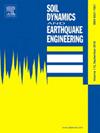Assessment of landslides induced by earthquake risk of Istanbul: A comprehensive study utilizing an integrated DFS-AHP and DFS-EDAS approach
IF 4.2
2区 工程技术
Q1 ENGINEERING, GEOLOGICAL
引用次数: 0
Abstract
Secondary disasters, the grim aftermath of earthquakes, encompass a range of life-threatening risks, including aftershocks, building collapses, landslides, tsunamis, fires, and water pollution. These disasters, far from being mere inconveniences, can cause significant damage and loss of life. The gravity of secondary disasters, particularly in high-risk areas like Istanbul, underscores the need for comprehensive study and preparation. This study specifically addresses the risk of post-earthquake landslides in Istanbul and emphasizes the importance of proactive preparation to mitigate the consequences of these hazards. It explicitly examines the European side of Istanbul and aims to rank the districts according to their post-earthquake landslide risk. The criteria for weighting are determined based on a comprehensive review of the literature on landslide risks triggered by earthquakes. The Decomposed Fuzzy Analytic Hierarchy Process (DFS-AHP) is used to determine the importance of each criterion, and the Decomposed Fuzzy Evaluation based on the Distance from Average Solution (DFS-EDAS) method ranks the alternatives. This study introduces a new approach that contributes methodologically and practically to the limited literature on secondary disasters. In particular, this study presents the first application of AHP and EDAS models integrated with DFS. This approach advances the literature and offers a replicable framework that can be adapted for similar risk assessments in other regions worldwide. By identifying high-risk zones and prioritizing areas for emergency response, this methodology provides a practical tool that can support disaster preparedness and response strategies globally. The study also aims to support municipal authorities in formulating effective preparedness and risk mitigation strategies appropriate to Istanbul's unique geological and urban structure.
求助全文
约1分钟内获得全文
求助全文
来源期刊

Soil Dynamics and Earthquake Engineering
工程技术-地球科学综合
CiteScore
7.50
自引率
15.00%
发文量
446
审稿时长
8 months
期刊介绍:
The journal aims to encourage and enhance the role of mechanics and other disciplines as they relate to earthquake engineering by providing opportunities for the publication of the work of applied mathematicians, engineers and other applied scientists involved in solving problems closely related to the field of earthquake engineering and geotechnical earthquake engineering.
Emphasis is placed on new concepts and techniques, but case histories will also be published if they enhance the presentation and understanding of new technical concepts.
 求助内容:
求助内容: 应助结果提醒方式:
应助结果提醒方式:


